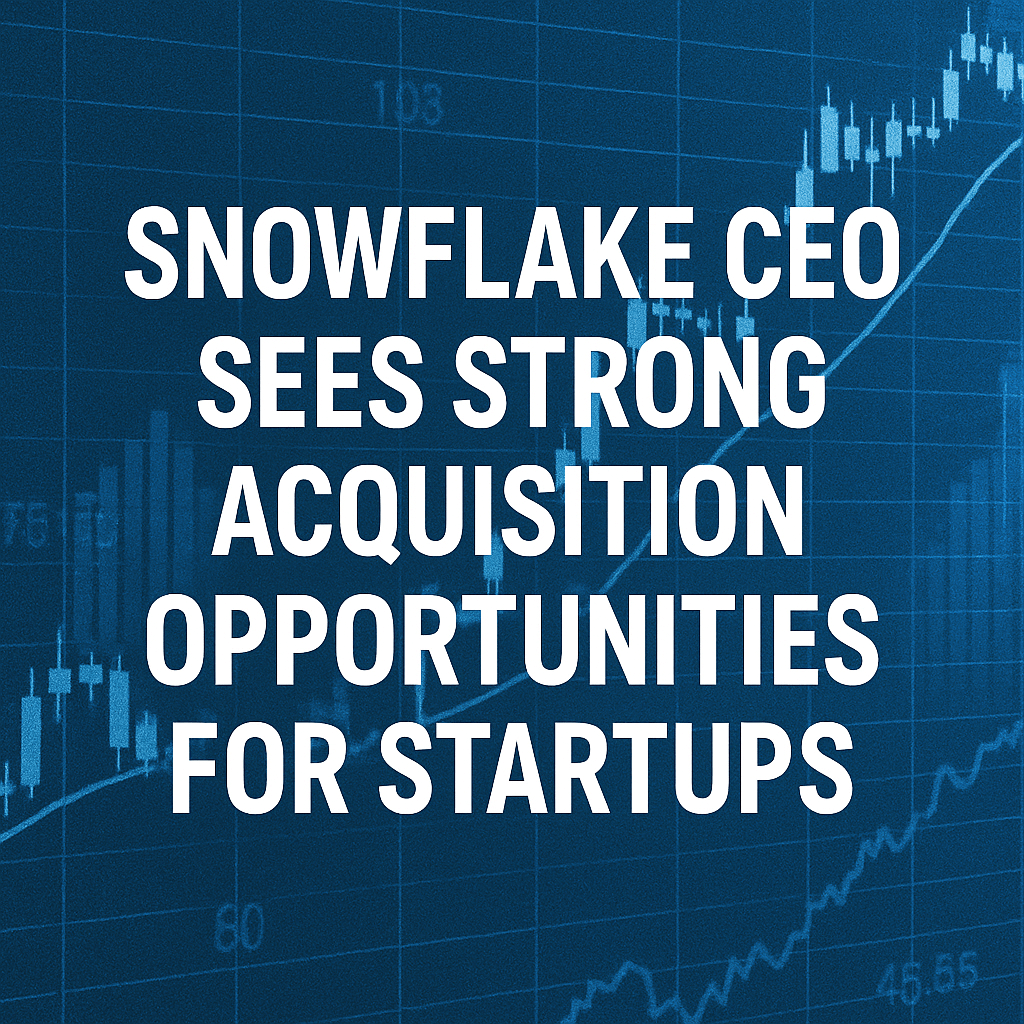Snowflake CEO Sees Strong Acquisition Opportunities for Startups

Sridhar Ramaswamy, the newly appointed CEO of Snowflake, a company with an impressive market capitalization of $70 billion since its 2023 IPO, believes that the current environment is ripe for acquisition activity, particularly for venture capital-backed startups.
Crunchy Data Acquisition and Rising Inquiries
On Monday, Snowflake announced its plans to acquire Crunchy Data for an estimated $250 million. This move highlights the company’s strategic focus on enhancing its cloud-based offerings, particularly in the data security and analytics space. In a follow-up interview with Fortune, Ramaswamy noted that a convergence of market conditions has led to what he describes as a “quite good” environment for deals.
Shifting Dynamics in Valuation and Funding
Ramaswamy explained that the changing dynamics of capital markets—particularly the transition from a zero-interest-rate environment—have altered the landscape for startup funding and valuations. In previous years, many startups enjoyed inflated valuations due to easy access to capital. “You could get a lot of funding in the zero interest rate environment, it’s just different now,” he remarked, emphasizing the need for more realistic valuations.
According to Ramaswamy, the number of inbound inquiries from startups seeking to explore acquisition opportunities has notably surged. He attributes this uptick to the challenging macroeconomic climate, which drives founders to reassess their company’s path to public markets or strategic sales. “There is a brisk interest in strategic exits for a lot of startups,” he stated.
Strategic Acquisition Trends in the Enterprise Tech Sector
Snowflake’s acquisition of Crunchy Data is part of a broader trend within the enterprise technology sector, where major players are consolidating to enhance their capabilities and maintain competitive advantages. A slew of recent high-profile deals underscores this trend, including:
- Salesforce’s planned $8 billion acquisition of Informatica.
- Databricks’ $1 billion acquisition of the data application Neon.
- Datadog’s acquisition of Eppo, a tool for data experimentation.
- ServiceNow’s acquisition of DataWorld, enhancing its data management capabilities.
Future Acquisition Plans: Opportunistic Strategies
While Ramaswamy refrained from disclosing specific future acquisition targets, he indicated that Snowflake would maintain an opportunistic approach to potential deals. He highlighted that while they are open to transformational acquisitions, each deal would need to be driven by strategic alignment and fit. “It has to be for the right company,” he stated, underscoring the importance of maintaining corporate culture post-acquisition.
The Importance of Cultural Fit and Shared Mission
Ramaswamy, a startup founder himself and former executive at Google, brings a unique perspective to acquisitions, emphasizing the preservation of the successful dynamics that contribute to a startup team’s achievements. He shared insights from his experience when his startup, Neeva, was acquired by Snowflake: “The team stayed together, and that’s critical.”
Moreover, he insists that prior to any acquisition, both the incoming team and the existing Snowflake team must have a clear understanding of a “shared mission.” He advises founders considering acquisition to ensure this alignment, stating, “If we cannot agree on the shared mission, you should not come.” This philosophy highlights a crucial aspect of corporate acquisitions, where cultural integration can significantly influence the success of the new entity.
Innovative Partnerships and Future Directions
Apart from acquisitions, Snowflake is also pursuing innovative partnerships to enhance its data services. Recently, the company entered into collaborations with media titans such as USA Today and the Associated Press, allowing these organizations to license their vast archives of news articles directly through the Snowflake marketplace. This initiative not only diversifies Snowflake’s data offerings but also positions the company as a central hub for developers looking to create AI applications.
Ramaswamy commented on this aspect, saying, “We feel like we can offer an effective way for people to monetize their data.” This strategy aligns with the growing trend of data monetization, making it essential for tech companies to adapt and offer attractive solutions in a data-driven world.
Conclusion
The current landscape suggests that now indeed may be an advantageous time for acquisitions within the technology sector. With evolving market conditions favoring strategic exits and a notable increase in startup inquiries, companies like Snowflake, under the direction of Ramaswamy, are well positioned to lead in a rapidly changing environment.
Source: fortune